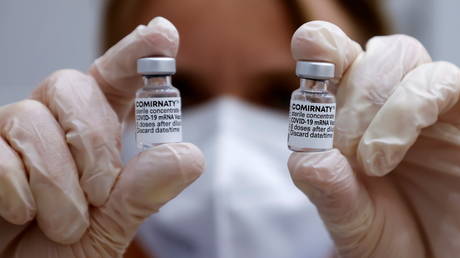
The European Commission says it has agreed to buy up to 1.8 billion doses of the Pfizer/BioNTech Covid-19 vaccine – the world’s biggest supply deal – amid concerns over unequal access for the world’s poorest nations.
The additional doses of the vaccine developed by US drug maker Pfizer and Germany’s BioNTech will be delivered from 2021 to 2023, European Commission President Ursula von der Leyen said at a briefing on Friday, adding that they will be used as booster shots.
The amount of doses ordered of the two-shot Comirnaty vaccine would be enough to inoculate the EU population of 450 million people twice over. A commission spokesperson told Reuters that half of the vaccines would be optional.
This is the third contract between the EU and Pfizer/BioNTech, with supplies of 600 million doses agreed under the two previous contracts.
“We will conclude in the next days. It will secure the doses necessary to give booster shots to increase immunity,” von der Leyen said during a visit to Pfizer’s vaccine plant in Belgium.
The deal comes as the World Health Organization slammed the inequity in the distribution of Covid-19 vaccines. In a report released on Friday, marking a year since the launch of the international COVAX dose-sharing facility, the head of the WHO said vaccines remain out of reach for the poorest countries.
“Nearly 900 million vaccine doses have been administered globally, but over 81% have gone to high- or upper middle-income countries, while low-income countries have received just 0.3%,” WHO director-general Tedros Adhanom Ghebreyesus said.
The agreement follows recent findings by the EMA that two other vaccines – AstraZeneca’s and Johnson & Johnson’s – may be linked to very rare but potentially deadly cases of blood clotting in some people. Both vaccines are based on viral vector technology, while that of Pfizer/BioNTech uses messenger RNA (mRNA) technology.
The European Commission is also looking to stop cooperation with AstraZeneca after the British-Swedish company slashed its delivery targets due to production problems.
Like this story? Share it with a friend!




